#auberon herbert
Explore tagged Tumblr posts
Text
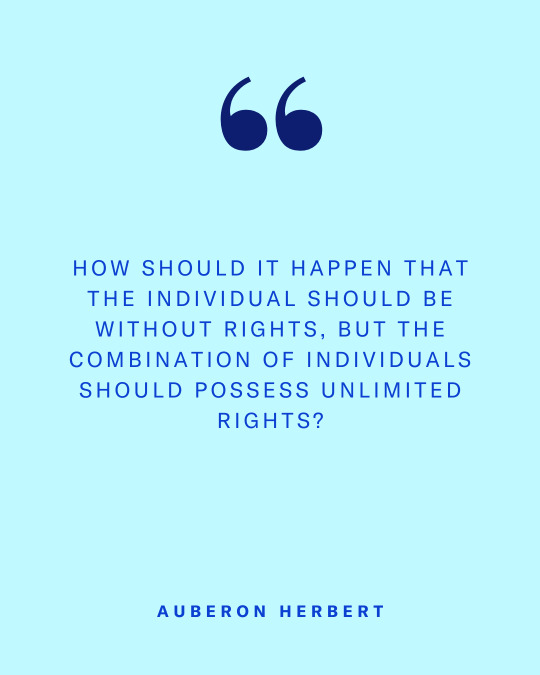
1 note
·
View note
Text
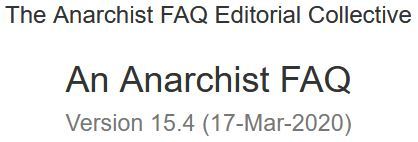
F.7.2 Is government compatible with anarchism?
Of course not, but ironically this is the conclusion arrived at by Hart’s analyst of the British “voluntaryists,” particularly Auberon Herbert. Voluntaryism was a fringe part of the right-wing individualist movement inspired by Herbert Spencer, a leading spokesman for free market capitalism in the later half of the nineteenth century. Like Hart, leading “anarcho”-capitalist Hans-Hermann Hoppe believes that Herbert “develop[ed] the Spencerian idea of equal freedom to its logically consistent anarcho-capitalist end.” [Anarcho-Capitalism: An Annotated Bibliography]
Yet, as with Molinari, there is a problem with presenting this ideology as anarchist, namely that its leading light, Herbert, explicitly rejected the label “anarchist” and called for both a government and a democratic state. Thus, apparently, both state and government are “logically consistent” with “anarcho”-capitalism and vice versa!
Herbert was clearly aware of individualist anarchism and distanced himself from it. He argued that such a system would be “pandemonium.” He thought that we should “not direct our attacks — as the anarchists do — against all government , against government in itself” but “only against the overgrown, the exaggerated, the insolent, unreasonable and indefensible forms of government, which are found everywhere today.” Government should be “strictly limited to its legitimate duties in defence of self-ownership and individual rights.” He stressed that “we are governmentalists … formally constituted by the nation, employing in this matter of force the majority method.” Moreover, Herbert knew of, and rejected, individualist anarchism, considering it to be “founded on a fatal mistake.” [Essay X: The Principles Of Voluntaryism And Free Life] He repeated this argument in other words, stating that anarchy was a “contradiction,” and that the Voluntaryists “reject the anarchist creed.” He was clear that they “believe in a national government, voluntary supported … and only entrusted with force for protection of person and property.” He called his system of a national government funded by non-coerced contributions “the Voluntary State.” [“A Voluntaryist Appeal”, Herbert Spencer and the Limits of the State, Michael W. Taylor (ed.), p. 239 and p. 228] As such, claims that Herbert was an anarchist cannot be justified.
Hart is aware of this slight problem, quoting Herbert’s claim that he aimed for “regularly constituted government, generally accepted by all citizens for the protection of the individual.” [quoted by Hart, Op. Cit., p. 86] Like Molinari, Herbert was aware that anarchism was a form of socialism and that the political aims could not be artificially separated from its economic and social aims. As such, he was right not to call his ideas anarchism as it would result in confusion (particularly as anarchism was a much larger movement than his). As Hart acknowledges, “Herbert faced the same problems that Molinari had with labelling his philosophy. Like Molinari, he rejected the term ‘anarchism,’ which he associated with the socialism of Proudhon and .. . terrorism.” While “quite tolerant” of individualist anarchism, he thought they “were mistaken in their rejections of ‘government.’” However, Hart knows better than Herbert about his own ideas, arguing that his ideology “is in fact a new form of anarchism, since the most important aspect of the modern state, the monopoly of the use of force in a given area, is rejected in no uncertain terms by both men.” [Op. Cit., p. 86] He does mention that Benjamin Tucker called Herbert a “true anarchist in everything but name,” but Tucker denied that Kropotkin was an anarchist suggesting that he was hardly a reliable guide. [quoted by Hart, Op. Cit., p. 87] As it stands, it seems that Tucker (unlike other anarchists) was mistaken in his evaluation of Herbert’s politics.
While there were similarities between Herbert’s position and individualist anarchism, “the gulf” between them “in other respects was unbridgeable” notes historian Matthew Thomas. “The primary concern of the individualists was with the preservation of existing property relations and the maintenance of some form of organisation to protect these relations… Such a vestigial government was obviously incompatible with the individualist anarchist desire to abolish the state. The anarchists also demanded sweeping changes in the structure of property relations through the destruction of the land and currency monopolies. This they argued, would create equal opportunities for all. The individualists however rejected this and sought to defend the vested interests of the property-owning classes. The implications of such differences prevented any real alliance.” [Anarchist Ideas and Counter-Cultures in Britain, 1880–1914, p. 20] Anarchist William R. McKercher, in his analysis of the libertarian (socialist) movement of late 19th century Britain, concludes (rightly) that Herbert “was often mistakenly taken as an anarchist” but “a reading of Herbert’s work will show that he was not an anarchist.” [Freedom and Authority, p. 199fn and p. 73fn] The leading British social anarchist journal of the time noted that the “Auberon Herbertites in England are sometimes called Anarchists by outsiders, but they are willing to compromise with the inequity of government to maintain private property.” [Freedom, Vol. II, No. 17, 1888]
Some non-anarchists did call Herbert an anarchist. For example, J. A. Hobson, a left-wing liberal, wrote a critique of Herbert’s politics called “A Rich Man’s Anarchism.” Hobson argued that Herbert’s support for exclusive private property would result in the poor being enslaved to the rich. Herbert, “by allowing first comers to monopolise without restriction the best natural supplies” would allow them “to thwart and restrict the similar freedom of those who come after.” Hobson gave the “extreme instance” of an island “the whole of which is annexed by a few individuals, who use the rights of exclusive property and transmission … to establish primogeniture.” In such a situation, the bulk of the population would be denied the right to exercise their faculties or to enjoy the fruits of their labour, which Herbert claimed to be the inalienable rights of all. Hobson concluded: “It is thus that the ‘freedom’ of a few (in Herbert’s sense) involves the ‘slavery’ of the many.” [quoted by M. W. Taylor, Men Versus the State, pp. 248–9] M. W. Taylor notes that “of all the points Hobson raised … this argument was his most effective, and Herbert was unable to provide a satisfactory response.” [Op. Cit., p. 249]
The ironic thing is that Hobson’s critique simply echoed the anarchist one and, moreover, simply repeated Proudhon’s arguments in What is Property?. As such, from an anarchist perspective, Herbert’s inability to give a reply was unsurprising given the power of Proudhon’s libertarian critique of private property. In fact, Proudhon used a similar argument to Hobson’s, presenting “a colony … in a wild district” rather than an island. His argument and conclusions are the same, though, with a small minority becoming “proprietors of the whole district” and the rest “dispossessed” and “compelled to sell their birthright.” He concluded by saying ”[i]n this century of bourgeois morality … the moral sense is so debased that I should not be at all surprised if I were asked, by many a worthy proprietor, what I see in this that is unjust and illegitimate? Debased creature! galvanised corpse! how can I expect to convince you, if you cannot tell robbery when I show it to you?” [What is Property?, pp. 125–7] Which shows how far Herbert’s position was from genuine anarchism — and how far “anarcho”-capitalism is.
So, economically, Herbert was not an anarchist, arguing that the state should protect Lockean property rights. Of course, Hart may argue that these economic differences are not relevant to the issue of Herbert’s anarchism but that is simply to repeat the claim that anarchism is solely concerned with government, a claim which is hard to support. This position cannot be maintained, particularly given that both Herbert and Molinari defended the right of capitalists and landlords to force their employees and tenants to follow their orders. Their “governments” existed to defend the capitalist from rebellious workers, to break unions, strikes and occupations. In other words, they were a monopoly of the use of force in a given area to enforce the monopoly of power in a given area (namely, the wishes of the property owner). While they may have argued that this was “defence of liberty,” in reality it is defence of power and authority.
What about if we just look at the political aspects of his ideas? Did Herbert actually advocate anarchism? No, far from it. He clearly demanded a minimal state based on voluntary taxation. The state would not use force of any kind, “except for purposes of restraining force.” He argued that in his system, while “the state should compel no services and exact no payments by force,” it “should be free to conduct many useful undertakings … in competition with all voluntary agencies … in dependence on voluntary payments.” [Herbert, Essay X: The Principles Of Voluntaryism And Free Life] As such, “the state” would remain and unless he is using the term “state” in some highly unusual way, it is clear that he means a system where individuals live under a single elected government as their common law maker, judge and defender within a given territory.
This becomes clearer once we look at how the state would be organised. In his essay “A Politician in Sight of Haven,” Herbert does discuss the franchise, stating it would be limited to those who paid a voluntary “income tax” and anyone “paying it would have the right to vote; those who did not pay it would be — as is just — without the franchise. There would be no other tax.” The law would be strictly limited, of course, and the “government … must confine itself simply to the defence of life and property, whether as regards internal or external defence.” In other words, Herbert was a minimal statist, with his government elected by a majority of those who choose to pay their income tax and funded by that (and by any other voluntary taxes they decided to pay). Whether individuals and companies could hire their own private police in such a regime is irrelevant in determining whether it is an anarchy.
This can be best seen by comparing Herbert with Ayn Rand. No one would ever claim Rand was an anarchist, yet her ideas were extremely similar to Herbert’s. Like Herbert, Rand supported laissez-faire capitalism and was against the “initiation of force.” Like Herbert, she extended this principle to favour a government funded by voluntary means [“Government Financing in a Free Society,” The Virtue of Selfishness, pp. 116–20] Moreover, like Herbert, she explicitly denied being an anarchist and, again like Herbert, thought the idea of competing defence agencies (“governments”) would result in chaos. The similarities with Herbert are clear, yet no “anarcho”-capitalist would claim that Rand was an anarchist, yet some do claim that Herbert was.
This position is, of course, deeply illogical and flows from the non-anarchist nature of “anarcho”-capitalism. Perhaps unsurprisingly, when Rothbard discusses the ideas of the “voluntaryists” he fails to address the key issue of who determines the laws being enforced in society. For Rothbard, the key issue was who is enforcing the law, not where that law comes from (as long, of course, as it is a law code he approved of). The implications of this is significant, as it implies that “anarchism” need not be opposed to either the state nor government! This can be clearly seen from Rothbard’s analysis of Herbert’s voluntary taxation position.
Rothbard, correctly, notes that Herbert advocated voluntary taxation as the means of funding a state whose basic role was to enforce Lockean property rights. The key point of his critique was not who determines the law but who enforces it. For Rothbard, it should be privatised police and courts and he suggests that the “voluntary taxationists have never attempted to answer this problem; they have rather stubbornly assumed that no one would set up a competing defence agency within a State’s territorial limits.” If the state did bar such firms, then that system is not a genuine free market. However, “if the government did permit free competition in defence service, there would soon no longer be a central government over the territory. Defence agencies, police and judicial, would compete with one another in the same uncoerced manner as the producers of any other service on the market.” [Power and Market, p. 122 and p. 123]
Obviously this misses the point totally. What Rothbard ignores is who determines the laws which these private “defence” agencies would enforce. If the laws are made by a central government then the fact that citizen’s can hire private police and attend private courts does not stop the regime being statist. We can safely assume Rand, for example, would have had no problem with companies providing private security guards or the hiring of private detectives within the context of her minimal state. Ironically, Rothbard stresses the need for such a monopoly legal system:
“While ‘the government’ would cease to exist, the same cannot be said for a constitution or a rule of law, which, in fact, would take on in the free society a far more important function than at present. For the freely competing judicial agencies would have to be guided by a body of absolute law to enable them to distinguish objectively between defence and invasion. This law, embodying elaborations upon the basic injunction to defend person and property from acts of invasion, would be codified in the basic legal code. Failure to establish such a code of law would tend to break down the free market, for then defence against invasion could not be adequately achieved.” [Op. Cit., p. 123–4]
So if you violate the “absolute law” defending (absolute) property rights then you would be in trouble. The problem now lies in determining who sets that law. For Rothbard, as we noted in section F.6.1, his system of monopoly laws would be determined by judges, Libertarian lawyers and jurists. The “voluntaryists” proposed a different solution, namely a central government elected by the majority of those who voluntarily decided to pay an income tax. In the words of Herbert:
“We agree that there must be a central agency to deal with crime — an agency that defends the liberty of all men, and employs force against the uses of force; but my central agency rests upon voluntary support, whilst Mr. Levy’s central agency rests on compulsory support.” [quoted by Carl Watner, “The English Individualists As They Appear In Liberty,” pp. 191–211, Benjamin R. Tucker and the Champions of Liberty, p. 194]
And all Rothbard is concerned over private cops would exist or not! This lack of concern over the existence of the state and government flows from the strange fact that “anarcho”-capitalists commonly use the term “anarchism” to refer to any philosophy that opposes all forms of initiatory coercion. Notice that government does not play a part in this definition, thus Rothbard can analyse Herbert’s politics without commenting on who determines the law his private “defence” agencies enforce. For Rothbard, “an anarchist society” is defined “as one where there is no legal possibility for coercive aggression against the person and property of any individual.” He then moved onto the state, defining that as an “institution which possesses one or both (almost always both) of the following properties: (1) it acquires its income by the physical coercion known as ‘taxation’; and (2) it acquires and usually obtains a coerced monopoly of the provision of defence service (police and courts) over a given territorial area.” [Society without a State, p. 192]
This is highly unusual definition of “anarchism,” given that it utterly fails to mention or define government. This, perhaps, is understandable as any attempt to define it in terms of “monopoly of decision-making power” results in showing that capitalism is statist (see section F.1 for a summary). The key issue here is the term “legal possibility.” That suggestions a system of laws which determine what is “coercive aggression” and what constitutes what is and what is not legitimate “property.” Herbert is considered by some “anarcho”-capitalists as one of them. Which brings us to a strange conclusion that, for “anarcho”-capitalists you can have a system of “anarchism” in which there is a government and state — as long as the state does not impose taxation nor stop private police forces from operating!
As Rothbard argues “if a government based on voluntary taxation permits free competition, the result will be the purely free-market system … The previous government would now simply be one competing defence agency among many on the market.” [Power and Market, p. 124] That the government is specifying what is and is not legal does not seem to bother him or even cross his mind. Why should it, when the existence of government is irrelevant to his definition of anarchism and the state? That private police are enforcing a monopoly law determined by the government seems hardly a step in the right direction nor can it be considered as anarchism. Perhaps this is unsurprising, for under his system there would be “a basic, common Law Code” which “all would have to abide by” as well as “some way of resolving disputes that will gain a majority consensus in society … whose decision will be accepted by the great majority of the public.” [“Society without a State,”, p. 205]
That this is simply a state under a different name can be seen from looking at other right-wing liberals. Milton Friedman, for example, noted (correctly) that the “consistent liberal is not an anarchist.” He stated that government “is essential” for providing a “legal framework” and provide “the definition of property rights.” In other words, to “determine, arbitrate and enforce the rules of the game.” [Capitalism and Freedom, p. 34, p. 15, p. 25, p. 26 and p. 27] For Ludwig von Mises “liberalism is not anarchism, nor has it anything whatsoever to do with anarchism.” Liberalism “restricts the activity of the state in the economic sphere exclusively to the protection of property.” [Liberalism, p. 37 and p. 38] The key difference between these liberals and Rothbard’s brand of liberalism is that rather than an elected parliament making laws, “anarcho”-capitalism would have a general law code produced by “libertarian” lawyers, jurists and judges. Both would have laws interpreted by judges. Rothbard’s system is also based on a legal framework which would both provide a definition of property rights and determine the rules of the game. However, the means of enforcing and arbitrating those laws would be totally private. Yet even this is hardly a difference, as it is doubtful if Friedman or von Mises (like Rand or Herbert) would have barred private security firms or voluntary arbitration services as long as they followed the law of the land. The only major difference is that Rothbard’s system explicitly excludes the general public from specifying or amending the laws they are subject to and allows (prosperous) judges to interpret and add to the (capitalist) law. Perhaps this dispossession of the general public is the only means by which the minimal state will remain minimal (as Rothbard claimed) and capitalist property, authority and property rights remain secure and sacrosanct, yet the situation where the general public has no say in the regime and the laws they are subjected to is usually called dictatorship, not “anarchy.”
At least Herbert is clear that his politics was a governmental system, unlike Rothbard who assumes a monopoly law but seems to think that this is not a government or a state. As David Wieck argued, this is illogical for according to Rothbard “all ‘would have to’ conform to the same legal code” and this can only be achieved by means of “the forceful action of adherents to the code against those who flout it” and so “in his system there would stand over against every individual the legal authority of all the others. An individual who did not recognise private property as legitimate would surely perceive this as a tyranny of law, a tyranny of the majority or of the most powerful — in short, a hydra-headed state. If the law code is itself unitary, then this multiple state might be said to have properly a single head — the law . .. But it looks as though one might still call this ‘a state,’ under Rothbard’s definition, by satisfying de facto one of his pair of sufficient conditions: ‘It asserts and usually obtains a coerced monopoly of provision of defence service (police and courts) over a given territorial area’ … Hobbes’s individual sovereign would seem to have become many sovereigns — with but one law, however, and in truth, therefore, a single sovereign in Hobbes’s more important sense of the latter term. One might better, and less confusingly, call this a libertarian state than an anarchy.” [Anarchist Justice, pp. 216–7]
The obvious recipients of the coercion of the new state would be those who rejected the authority of their bosses and landlords, those who reject the Lockean property rights Rothbard and Herbert hold dear. In such cases, the rebels and any “defence agency” (like, say, a union) which defended them would be driven out of business as it violated the law of the land. How this is different from a state banning competing agencies is hard to determine. This is a “difficulty” argues Wieck, which “results from the attachment of a principle of private property, and of unrestricted accumulation of wealth, to the principle of individual liberty. This increases sharply the possibility that many reasonable people who respect their fellow men and women will find themselves outside the law because of dissent from a property interpretation of liberty.” Similarly, there are the economic results of capitalism. “One can imagine,” Wieck continues, “that those who lose out badly in the free competition of Rothbard’s economic system, perhaps a considerable number, might regard the legal authority as an alien power, a state for them, based on violence, and might be quite unmoved by the fact that, just as under nineteenth century capitalism, a principle of liberty was the justification for it all.” [Op. Cit., p. 217 and pp. 217–8]
#faq#anarchy faq#revolution#anarchism#daily posts#communism#anti capitalist#anti capitalism#late stage capitalism#organization#grassroots#grass roots#anarchists#libraries#leftism#social issues#economy#economics#climate change#climate crisis#climate#ecology#anarchy works#environmentalism#environment#solarpunk#anti colonialism#mutual aid#cops#police
13 notes
·
View notes
Text
In his Contemporary Review article, “The Ethics of Dynamite” (reproduced in The Right and Wrong of Compulsion by the State, Liberty Fund, 1978), Auberon Herbert argued that the “dynamiters” (the terrorists) were not really against government:
Perhaps I ought at once, for the benefit of some of my friends who are inclined a little incautiously to glorify this word “governing” without thinking of all that is contained in it, to translate the term, which is so often on our lips, into what I hold to be its true meaning: forcing your own will and pleasure, whatever they may be, if you happen to be the stronger, on other persons. … Dynamite is not opposed to government; it is, on the contrary, government in its most intensified and concentrated form. … [Dynamite] is a purer essence of government, more concentrated and intensified, than has ever yet been employed. It is government in a nutshell, government stripped, as some of us aver, of all its dearly beloved fictions, ballot boxes, political parties, House of Commons oratory, and all the rest of it. How, indeed, is it possible to govern more effectively, or in more abbreviated form, than to say: “Do this—or don’t do this—unless you desire that a pound of dynamite should be placed tomorrow evening in your ground-floor study.” It is the perfection, the ne plus ultra, of government.
Speaking of the terrorists, he harangued governments of his time:
Here is your own child. This is what your doctrine of deified force, this is what your contempt of human rights, this is what your property in men and women leads to.
0 notes
Text
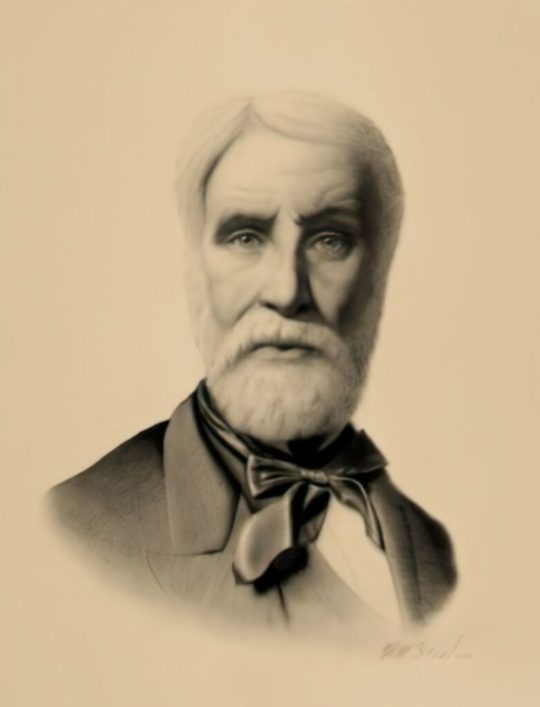
Alredered Remembers Auberon Herbert, English writer, theorist, and philosopher and isis known as the originator of voluntaryism, on his birthday.
"The career of a politician mainly consists in making one part of the nation do what it does not want to do, in order to please and satisfy the other part of the nation."
0 notes
Text

Se o governo há meio século atrás nos tivesse fornecido todos os nossos jantares e café da manhã, seria prática dos nossos oradores hoje assumir a impossibilidade de nos sustentarmos.
Auberon Herbert
0 notes
Link
"In other words, Herbert wanted the independence of mankind from all overreaching government, not the mere replacement of one pack of wolves for another, even a smaller or less voracious pack." ~ Robert E. Wright
0 notes
Photo
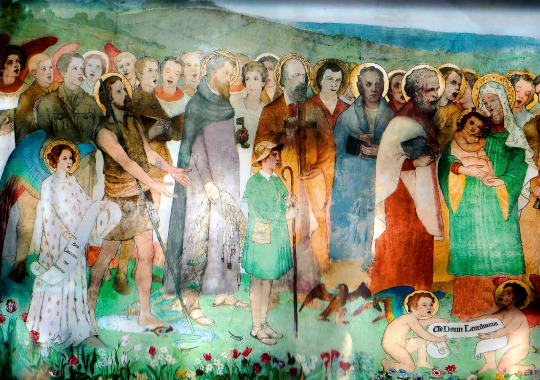
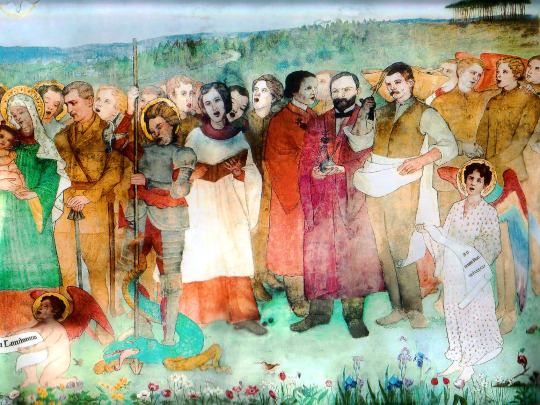
Mural in All Saints Church, Thorney Hill by Phoebe Anna Traquair (1920-2), commissioned by the 3rd Baron Manners, commemorating the loss of his wife and two of his children. The mural depicts the Manners family and others, including at least four members of the Coterie who were killed in action in WWI — Capt. Bron Herbert; Lt. Raymond Asquith; Lt. Edward Horner; and Lt. John Manners — as well as Betty Asquith (née Manners), Katharine Asquith (née Horner), and Laura, Lady Lovat (née Lister) as the Madonna. The Manners family is depicted as they were in 1904, the year Molly Manners died.
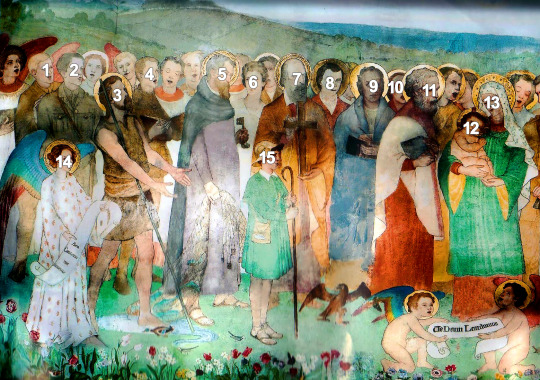
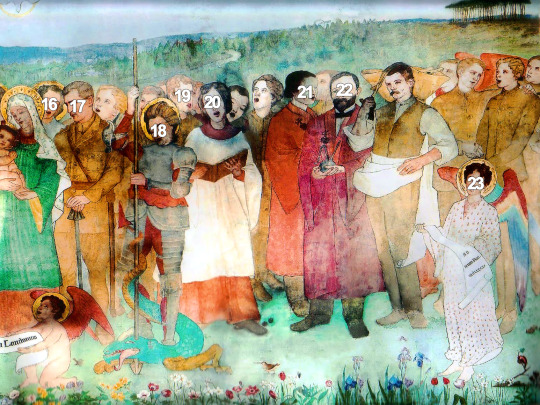
1. 2. 4. all sons of the Bishop of Exeter (see 11 below): Lt. Randle Gasycone-Cecil (1889-1917), Capt. John Gascoyne-Cecil (1893-1918), and Lt. Rupert Gasycone-Cecil (1895-1915)
3. Eric Gill (1882-1940), carver of the chapel, as St. John the Baptist
5. Charles Gore (1853-1932), as St. Peter the Apostle
6. Constance Manners (née Hamlyn-Fane), Lady Manners (1861-1920)
7. Alfred, Lord Tennyson (1809-1892), as St. John the Evangelist as prophet
8. Capt. Auberon ‘Bron’ Herbert, 9th Baron Lucas (1876-1916)
9. William Blake (1757-1827), as St. John the Evangelist as writer
10. Phoebe Anna Traquair (1852-1936), self-portrait of the artist
11. Lord William Cecil (1863-1936), Bishop of Exeter, as St. Joseph
12. Hon. Frances Manners, later the 4th Baron Manners (1897-1972), as the Christ child
13. Laura Fraser (née Lister), Lady Lovat (1892-1956), as the Madonna
14. Angela Manners (1889-1970), as an angel
15. Lt. Hon. John Manners (1892-1914), as a pilgrim child
16. Katharine Asquith (née Horner) (1885-1976)
17. Lt. Raymond Asquith (1878-1916)
18. John Manners-Sutton, 3rd Baron Manners (1852-1927), as St. George killing the dragon
19. Lt. Edward Horner (1888-1917)
20. Hon. Mary ‘Molly’ Manners (1886-1904)
21. Joseph Lister, 1st Baron Lister (1827-1912)
22. Louis Pasteur (1882-1895)
23. Hon. Betty Asquith (née Manners) (1889-1962), as an angel
photos and identification credit to E. J. Duckworth
#phoebe anna traquair#art#1920#1922#1920s#wwi#the coterie#bron herbert#raymond asquith#edward horner#john manners#betty asquith#katharine asquith#laura lovat#🕰️
5 notes
·
View notes
Quote
The career of a politician mainly consists in making one part of the nation do what it does not want to do, in order to please and satisfy the other part of the nation. It is the prolonged sacrifice of the rights of some persons at the bidding and for the satisfaction of other persons. The ruling idea of the politician — stated rather bluntly — is that those who are opposed to him exist for the purpose of being made to serve his ends, if he can get power enough in his hands to force these ends upon them.
Auberon Herbert
13 notes
·
View notes
Text
types of center anarchism because im a nerd who hates when r/pcm says its just monke
anprim: monke ooga booga. technically off compass. read ted kaczynski or smth.
egoism: labels are a spook. also off compass. read max stirner
anarcho individualism: a bit generic, applies to most libcenter ideologies. read anything listed.
mutualism: left leaning. was the first type of anarchism ever written technically. read pierre-joseph proudhon
volunteerism: right leaning. one of the many ancap rebrands. read auberon herbert
agorism: usually right leaning. slight ancap rebrand that really likes black markets. read konkin
georgism: land lords dont deserve rights. has several different versions. read henry george
post left: depressed. go cry [but for real most of the books here work]
#welcome to sollux is a nerd who knows too much about types of anarchism#below the line means your a friend of mine 👍#im a bit confused about volunteerism so if anyone knows more about it hmu#also bullying post lefties is very fun#i might make actual in depth posts explaining these#but not rn#anarchism#anarchy#libunity#libertarian#egoism#anarcho capitalism#anarcho communism#anarcho primitivism#gather anarchists#reading list#politics#post left
29 notes
·
View notes
Text
Mutluluğa giden yol için iki öneri;
Kendinden çok şey,
Başkalarından az şey bekle...
Auberon Herbert
4 notes
·
View notes
Quote
Every tax or rate, forcibly taken from an unwilling person, is immoral and oppressive.
0 notes
Text
rationalism and war
Of all the sources for the New Deal, economics was by far the most influential, but there were other authors mentioned in connection with the agency as well. Some of the authors mentioned were of more familiar names: Robert Heilbroner, a former associate of Keynes and the author of a book called The Revolution Was Proletarian; L. Sachs, a professor of the economics of peace and a devotee of mutual security; and Auberon Herbert, an American economics writer, writing under the pen name Auberon D. Thornberry.
(Note: As far as I can tell, it’s not clear what exactly is being said in the story. From the tantalizing excerpts it looks to me like the author is interested in military experience as a proxy for political and economic experience. He mentions a number of people who had a lot of war experience but doesn’t indicate that this is the real experience; one wants to cast a wider net in any event but.)
jad ers
This article, from 1945, is of particular interest because it seems to have been written as a play on the danger of communism and the rising American military. (I remember it having something to do with Harry Truman being a believer in a Pax Americana in Europe. I’m not sure.) Much of the article is dedicated to a defense of the (implicit?) American national interest, which it develops in opposition to communism and communism. E.g.
Between thirty and three hundreds of millions of human beings are today fighting for the defense of the United States of America. Most of these men and millions of women have suffered unfortunatly the fate of having to go to war and have sacrificed much and toilsome labor and every pleasure it is possible for a human being to have.
[…]
I call upon you with all the power that is in my command to realize that the service of millions upon millions is the best that this great country has to offer for the defense of the title of independence of the American people, and that the disposal of every life is the interest of this nation.
The capitalist system which you profess to oppose, that is, capitalism, is the greatest affliction that the masses can give to the powers of wealth to the masses. It exploits them, enslaves them, and seizes them at the last moment of their freedom. It blocks the way to progress, to growth, to justice, to freedom, to health, to the highest level of human achievement. The bombastic spokesman of the stock exchange demands that you join the economic machine that was formerly devoted to devotion to service, and that you have at the service of his own interests, even
1 note
·
View note
Text
Mutluluğa giden iki yol;
1-Kendinden çok şey,
2-Başkalarından az şey bekle...!
Auberon Herbert

17 notes
·
View notes
Quote
Do you not see, first, that — as a mental abstract — physical force is directly opposed to morality; and, secondly, that it practically drives out of existence the moral forces? How can an act done under compulsion have any moral element in it, seeing that what is moral is the free act of an intelligent being? If you tie a man’s hands there is nothing moral about his not committing murder. Such an abstaining from murder is a mechanical act; and just the same in kind, though less in degree, are the acts which men are compelled to do under penalties imposed upon them by their fellow men. Those who would drive their fellow men into the performance of any good actions do not see that the very elements of morality — the free act following on the free choice — are as much absent in those upon whom they practice their legislation as in a flock of sheep penned in by hurdles.
Auberon Herbert
4 notes
·
View notes
Text
Established a war hospital

Howick Hall provided a great atmosphere for those recovering from injuries. At the time the hall was inhabited by Lady Sybil Grey, daughter of the fourth Earl Grey, who dedicated her home and her time to helping her patients. The hall’s ballroom was transformed into a ward and over 400 patients were looked after by Sybil, her family and local volunteers. Howick Hall in Alnwick, Northumberland was transformed into a hospital at the very outbreak of the war in 1914. Attingham Park Mansion had 60 beds for wounded soldiers and an operating theatre was built for doctors to attend more serious war injuries. Teresa bravely served as a nurse for the Red Cross on the Italian front line before immigrating to Britain, before marrying Lord Berdwick at the end of the war. A philanthropic couple, Teresa came to England from Italy in 1914 to help Belgian refugees while Lord Berwick opened up his mansion to convalescing wounded soldiers. The Attingham Estate in Shrewsbury was owned by Lord Berwick and his wife Teresa Hulton. I have no volunteer nurses in the Abbey Hospital.�� In February of 1915, The British Journal of Nursing reported her saying, ‘One cannot touch hospital work without at once grasping the importance of trained nursing, how all essential it is. The Duchess took her work as a hospital worker very seriously. This was after her offer to volunteer her yacht and crew as a patrol boat was rejected. The stables were also converted into a ward to house more soldiers. Mary, the wife of the 11th Duke of Bedford, took on the dual role of administrator and nurse when she opened Woburn Abbey to the public as a military hospital in 1914. They also created a surgery room, along with a smoking room and a reading room for the soldiers’ exclusive use.įamously the birthplace of Sir Winston Churchill, the palace was offered out as a hospital by the 9th Duke of Marlborough and his sisters, along with Gwendoline Spencer Churchill, Sir Winston’s sister-in-law. The palace converted the Long Library into a ward, providing around 50 beds for wounded soldiers. The building was repaired, but never reopened as a hospital again.īlenheim Palace in Oxfordshire was owned by the Marlborough family, who kindly donated their home to become a war hospital in 1914. It is estimated that around 1160 men were treated in this beautiful home as it rose to be one of the best convalescent homes in the country, before suffering a fire in 1916. Nan left a diary detailing various tales told by the soldiers whom she cared for – some of which are currently on display in Wrest Park, now a National Heritage site. Hundreds of women acted as nurses at Wrest Park in those four years, led by the owner’s sister Nan Herbert, who volunteered as matron. It was thought to be the first stately home to be converted into an auxiliary hospital. Wrest Park in Bedfordshire acted as a hospital between 1914-1918, after it was donated by its owner Auberon Herbert. Their youngest daughter trained as a nurse. Seventeen Red Cross nurses were brought in and a matron was hired to run the hospital, as Mrs Daisy Lloyd, the wife of the owner, was a keen gardener and wished to devote her time to maintaining the estate and its surrounding grounds.ĭespite his parents’ lack of interest in medicine, Oliver, the eldest son of Nathaniel and Daisy Lloyd who was only 3 when the war began, grew up to be a doctor. The great hall and the solar were converted into temporary wards to house 20 patients at a time, while the solar was also used as a refectory for the injured troops. Dunham Massey Hall, now owned by the National Trust, is open to visitors and has recreated the soldiers’ refectory in the Great Hall.įor four years during World War I, Great Dixter opened its doors to 380 wounded soldiers. Soldiers would play chess, walk on the grounds and take boat trips to pass the time while recovering from their various injuries. The hospital treated 282 soldiers over two years and quickly became known as the ‘safe house’ amongst those returning from the Western Front. Lady Stamford’s daughter, Lady Jane Grey trained as a nurse in order the help the wounded soldiers who came to the Hall to recover. The princes and people of India donated the Indian Gate, located at the Southern entrance of the grounds, to say thank you for the care and attention the Royal Pavilion staff showed their soldiers.ĭunham Massey Hall in Cheshire was transformed in to the Stamford Military Hospital when Lady Stamford offered it to the Red Cross in 1917. Country Life's Top 100 architects, builders, designers and gardeners.

1 note
·
View note
Quote
All unity that exists by means of social or artificial restraint of differences, is slowly but inevitably moving toward its own destruction—a destruction that must finally involve much pain and confusion and disorder, because change and adaptation have been so long resisted.
Auberon Herbert
0 notes